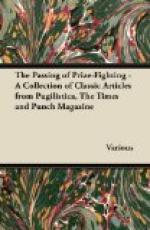so? Would not a good cigar during a good piece
be on additional “draw?” We have “Smoking
Concerts”; why not “Smoking Theatricals”?
But how about the Ladies? Years ago there were
no smoking-carriages on the Railways. And what
nowadays is the proportion of smoking to non-smoking
compartments? Very small. The Ladies will
decide this question.
But how about the Actors?
In modern pieces they never lose an opportunity of
smoking. Why shouldn’t the cigar be introduced
into Shakspearian revivals? Anachronism to the
winds!—which is a polite way of expressing
“Anachronism be blowed!” ’Baccy
be blowed too. Sir WALTER RALEIGH would have approved
its introduction in Elizabethan days. In
Twelfth
Night for example, the line, “Help me to
some light,” is suggestive; so, also, in
Macbeth—“Give
us a light, then”—out comes the cigar.
Titus Andronicus might be revived, with a view
to inaugurating the innovation, and the line, “Some
of you shall smoke,” would be the signal for
the production of many a cigar-case in point.
Hamlet
could, perhaps, find some authority for reading the
line, “Will you play upon this pipe?”
as, “Will you smoke this pipe?” And the
other actor would reply, “Certainly—and
thank you, my Lord, I have one of my own.”
Mr. EDWARD TERRY has no objection to
The Churchwarden
in his theatre, and his Churchwarden drew very well.
However, we’ve had this discussion before.
Will it end this time, as it has hitherto done, in
smoke? Let us suppose a Shakspearian play under
the proposed conditions:—
[Illustration: “Can you play upon this
pipe?”]
SCENE II.—Capulet’s
Garden. After ROMEO’s soliloquy, which,
perhaps, has produced a thirstiness among the audience,
resulting in several orders for drinks having been
given, JULIET appears on balcony.
“Juliet. Ah, me!” [Popping
of corks, and striking of matches.
“Romeo. She speaks!—”
Fascinating Female Attendant in Stalls.
One whiskey, Sir?
“Romeo. Oh, speak again, bright
angel!”
Thirsty Party in Stalls. No; I said B.
and S.—bring it quick.
“Romeo (continuing). As is
a winged messenger of heaven.”
Second Fascinating Attendant. Which Gent
ordered gin-sling? (No one pays any attention.
Attendant sees a mild man listening as earnestly as
he can to the play.) Did you order a sling, Sir?
Earnest Listener (irritably). No,
no—I don’t want anything. There,
I’ve lost the last part of ROMEO’s speech.
[Steels himself against
further distractions, and tries to
concentrate all his attention
on the play.
“Juliet. O, ROMEO! ROMEO! wherefore
art thou, ROMEO?” &c.
“Romeo (aside). Shall I hear
more, or shall I speak at this?”
Excited Somebody (in distant Stall, beckoning
to Second Attendant). Here! Hi!
Here! I ordered gin-sling.




